by Shannon Booker, PGY-3
The Global Health Track is an exciting opportunity for residents interested in international health. This track introduces important topics in global health such as the identification and treatment of tropical diseases as well as ethical issues related to practicing medicine in other cultures. One of the Track's most exciting features is actually participating in an international rotation. We asked three residents about their Global Health Track projects this academic year to find out more about where they went, what they learned, and what they hope the experience brings to their practice of medicine.
Robert Oubre, PGY-3.
Robert is going to work as a hospitalist in Baton Rouge, Louisiana after completing residency.
I went to Roatan, an island off the cost of Honduras, for three and a half weeks as well as the mainland of Honduras for five days. The first time I went to Central America was between my first and second years of medical school. I spent most of my summer in Guatemala - one week of medical brigades in the mountain villages and the rest at a public hospital in Guatemala City.
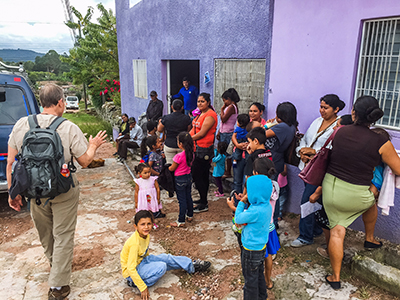 Dr. Curry arriving to the clinic at Ojojona.
Dr. Curry arriving to the clinic at Ojojona.
I discovered that the Guatemalans had little to no access to health care. Even in the cities, much of the middle and lower classes were limited to emergency care at the public hospital. In the mountain villages, many had never seen a healthcare professional. If they had, it was often from medical mission trips which had passed through.
During that summer, I not only developed a passion for global health and became more aware of health disparities but also fell in love with the Central American people and was amazed at their deep appreciation for what little I could offer them. Therefore, I wanted to return to Central America for my Global Health trip.
The healthcare plight of the people of Roatan is similar if not worse than that of the Guatemalans. Of course, I wanted to volunteer my time to provide medical care to this underserved community. However, my motivations for the trip extended a bit further. My trip was two fold. First on Roatan, volunteering in a permanent clinic which survives on donations and is run by a mix of locals and expatriate foreigners. Second in mainland Honduras, traveling from village to village holding day-long medical brigades with a group of Americans who traveled temporarily to the country for about a week.
Each of these forms of health-care delivery come with its own advantages, disadvantages, challenges, limitations and impact on the community. I sought to explore these differences. Learning from these, I ultimately hope to develop a model which is able to overcome the obstacles of short-term medical missions while delivering sustainable health-care which addresses chronic medical conditions and issues of public health to remote under served communities. Thanks to UAB, this trip was one step closer to achieving that goal.
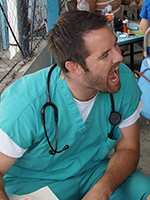 My Spanish isn't the best. When I said "Abra su broca" I often had to demonstrate it for them!
My Spanish isn't the best. When I said "Abra su broca" I often had to demonstrate it for them!
My most memorable part of the trip was going out to a community called La Calonia nearby the clinic at which I was working on Roatan. It was part of a community outreach program which included weighing and measuring children and plotting them on a growth curve, delivering extra formula/food to underweight children, blood pressure checks for the adults and educating the people on public health issues such as protection from mosquito bites.
Leaving the clinic and going out into the community and into their homes was an eye-opening experience which gave me a better understanding of how their lifestyles and living environment predisposed them to certain diseases. For example, indoor plumbing was non-existent. Many homes relied on water cisterns which collected standing water. This, in addition to the open-air style homes, exposed them to mosquitoes and the many diseases they carry. Furthermore, their lack of water provided an explanation of why many presented to the clinic with dehydration-related headaches and also caused me to avoid prescribing diuretics as anti-hypertensives. The experience reminded me how truly understanding a patient's living situation could help me better care for them.
After travelling so far to care for an under served population, I brought back with me a better appreciation for the under served population right here in Birmingham. Additionally, my experience in Honduras reminded me to always keep in mind the situation in which that patient is living and the economic and social factors that play into their diseases.
Mack Brown, PGY-3.
Mack will be one of our chief residents next year.
My trip took me to Dehradun, India, a city of roughly 800,000 people six hours north of New Delhi. My clinical experience involved working with physicians in several different care settings. These included two 30-bed hospitals in the city of Dehradun, a clinic in the small village of Patti and another hospital in Mussoorie, a city in the Himalayan foothills.
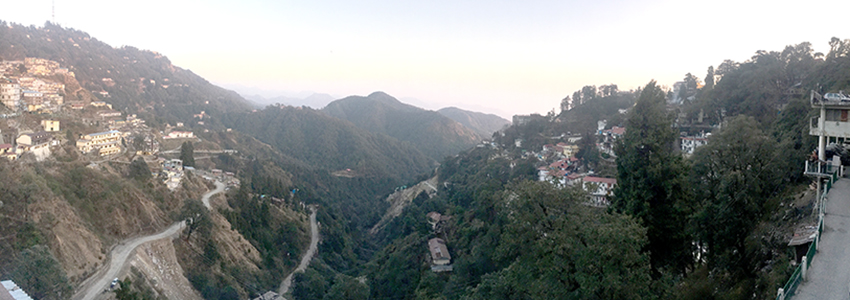 Sunset over the Himalayan foothills in Mussoorie, India
Sunset over the Himalayan foothills in Mussoorie, India
I chose India for several reasons. It is a country I had travelled to on a previous trip, and I was drawn back by its rich culture and natural beauty. I was interested in different aspects of a country’s health care system, and the program, arranged through Child Family Health International, allowed me to experience multiple different clinical environments. The beauty of the Himalayas didn’t hurt the sales pitch either.
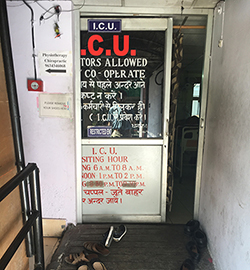 ICU entrance at City Heart Hospital in Dehradun, India
ICU entrance at City Heart Hospital in Dehradun, India
There are so many parts of my trip that I will carry with me, but I think the most striking was a patient walking in to the hospital carrying an EKG that showed an anterior wall STEMI. It had been performed the day before and he was told, “you should go find a cardiologist.”
First and foremost, I found a new appreciation for the abundance of resources that we physicians have at our disposal in the United States. From big aspects like medical infrastructure and a functioning EMS system to little things like working IV pumps and the ability to do labs in the hospital, I don’t think I appreciated the challenges that come with practice in a truly resource poor environment. I also found I had a great deal to learn from my host physicians, and some of those lessons they shared I plan to carry with me far into my future practice.
Matt Gravett, PGY-3.
Matt will be starting his fellowship in Infectious Diseases at UAB this fall.
I went to Lima, Peru, to attend the Gorgas Diploma Course in Tropical Medicine and Hygiene. It's an intense, 9-week course based at Universidad Peruana Cayetano Heredia Hospital. It features lectures from renowned experts in the various fields of tropical medicine and infectious diseases; there is also a particular emphasis on clinical teaching, and, as such, there are bedside teaching rounds as well as clinical laboratory training as well. During the course, we also traveled to Cusco in the Andes and Iquitos in the Amazon of Peru to visit regional hospitals in those areas.
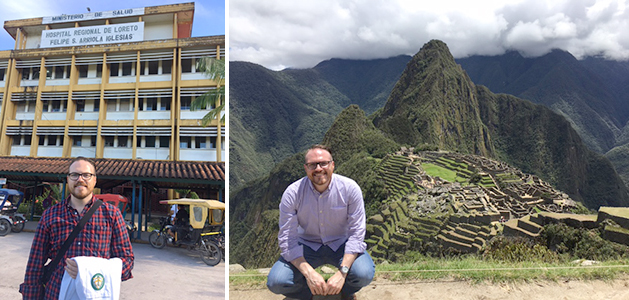 Left: Matt in front of the Ministry of Health. Right: At Machu Picchu.
Left: Matt in front of the Ministry of Health. Right: At Machu Picchu.
The most memorable aspect of the course is certainly the patients with the myriad of diseases that would never be seen in the United States. They travel long distances, and some over several days, to be evaluated and treated by the Gorgas course.
I have learned a tremendous amount from this course, and I will bring back new knowledge to Birmingham. People in the Alabama travel all over the world and can return with many various diseases, which goes to say that tropical medicine can come back to Birmingham! Outside of that, I have seen poverty, destitution, and conditions that tremendously impact one's health such that it is not something to be taken for granted in the US. It is very inspiring to see that so much care can be given with such seemingly little resources. It was a truly unforgettable experience.